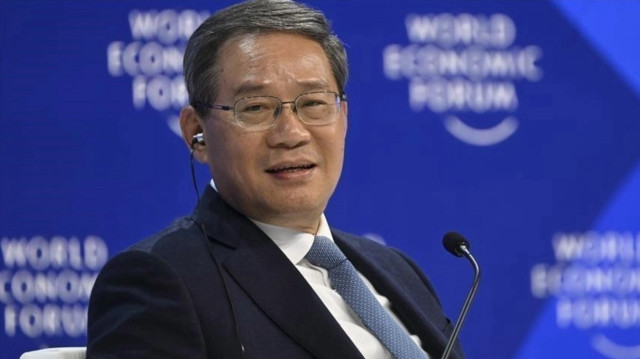
Chinese Premier Li Qiang's rare visit to Egypt comes as countries boost partnerships across defense, trade, tech, and infrastructure
Chinese Premier Li Qiang's arrival in Egypt on Wednesday marks a significant step in Beijing's effort to boost its partnership with Cairo, a longtime American ally and one of the region's most influential players.
China announced the two-day visit last week, noting that “under the strategic guidance of the two countries' leaders, the bilateral relationship has flourished, political mutual trust has been deepened and practical cooperation in various fields has yielded fruitful results.”
This is a rare and symbolic visit of a Chinese leader to the region, Andrea Ghiselli, a lecturer at the University of Exeter and head of research at the TOChina Hub's ChinaMed Project, told Anadolu.
Ghiselli and other analysts see the trip as a key step in deepening ties across defense, trade, technology, and infrastructure development.
“China certainly is trying to seize the moment of uncertainty in Washington's relationship with Cairo under the second Trump administration to deepen and expand its ties,” William Yang, senior Northeast Asia analyst at the International Crisis Group, told Anadolu.
The two countries have held several high-level meetings in recent years, including Egyptian President Abdel Fattah al-Sisi's state visit to Beijing last May, when he also attended the China-Arab States Cooperation Forum.
Yang added that increasingly frequent exchanges are injecting momentum into a relationship that “clearly contains strategic importance to China's efforts to increase its presence and influence in North Africa.”
“The region is tired of the West, and the West is also tired of the region because of endless wars,” added Ghiselli.
- Military cooperation gains ground
A central pillar of the growing Beijing-Cairo partnership is defense cooperation, with China steadily advancing into a space long dominated by Western powers.
Li's visit coincides with reports that Cairo has deployed China's HQ-9B air defense system, a sign of Egypt moving away from its traditional reliance on American military support.
Multiple media outlets report that Egypt acquired the long-range surface-to-air missile system to counter short-range ballistic missiles, fighter jets, and cruise missiles.
Military ties have notably deepened, with Chinese and Egyptian air forces holding their first joint drill this April. Dubbed “Eagles of Civilization 2025,” the exercise took place at an Egyptian air base. China's People's Liberation Army Air Force deployed J-10C fighter jets, YU-20 aerial tankers, and KJ-500 early warning aircraft alongside Egypt's MiG-29s.
During the 18-day exercise, the South China Morning Post reported an Egyptian pilot flying a J-10 jet, reigniting speculation about a potential sale to Egypt. “The growing number of military drills that China conducts with Egypt is a very important indicator that China thinks it is prepared and ready to put more emphasis on the security aspect of its relationship with regional countries,” said Yang.
Ghiselli added that China's military technology gained visibility during recent India-Pakistan clashes, where Pakistani forces used Chinese systems.
Beyond drones, “air defenses and jet fighters are all part of the discussions,” he said.
- Trade and investment surge
China ranks among Egypt's top commercial partners, with bilateral trade hovering around $14 billion annually.
Data from the Observatory of Economic Complexity shows that in May 2025, China exported $1.63 billion to Egypt and imported $78.8 million, leaving a trade surplus of $1.55 billion.
Between May 2024 and May 2025, Chinese exports to Egypt rose by $247 million – a 17.9% increase – while imports climbed by 63.4% to $78.8 million.
Egypt is also emerging as a key destination for Chinese investment in the region. The Suez Canal Economic Zone (SCZone), central to Egypt's development strategy, has attracted more than $8 billion in reported Chinese investment.
Yang notes that Egyptian control of the Suez Canal – a critical waterway for global trade – is another reason why Beijing wants to seize the moment of American volatility to increase bilateral ties.
He added that North Africa is a key node in China's Belt and Road Initiative (BRI), given the region's location and proximity to Europe via the Mediterranean. Egypt's Vision 2030 economic plan is closely linked to the initiative.
Last year, the two sides marked a “golden decade” of their comprehensive strategic partnership.
- Long-standing ties, shifting alliances
Egypt was the first Arab and African country to recognize and establish diplomatic ties with China in 1956, a reflection of the long-standing and strategic nature of their relationship.
“Egypt has always been seen by China as a very important player in the region exactly because of its geographical position, the Suez Canal, and of course, because it's both a Middle Eastern and an African country,” Ghiselli said.
He added that Egypt's significance goes beyond economics, particularly amid regional conflicts such as Israel's genocidal war on Gaza.
On China's diplomacy in the Middle East and North Africa, Ghiselli said there are countries Beijing would prefer to see cooperating more closely, including Egypt and Ethiopia.
“Media suggest that both Ethiopia and Egypt have tried to pull China on their side over the Nile River issue. I don't think China would like to prefer one over the other,” he said, suggesting that China's current approach is broader, more reactive, and aimed at avoiding entanglement in regional disputes.
Ghiselli said North African countries like Egypt are deepening ties with China not only due to “Western fatigue or declining influence,” but also because they view Beijing as an increasingly attractive partner.
China has a lot to offer, he said, including diplomatic support at the UN Security Council and economic assistance.
He highlighted a growing push across the Middle East, including in Egypt, for a green transformation, an area where China leads through its dominance in solar and other renewable technologies.
“China is both a competitor and a partner … China offers not just products that you buy in the shop, but also technology and investment – all things that are very attractive,” he said.







